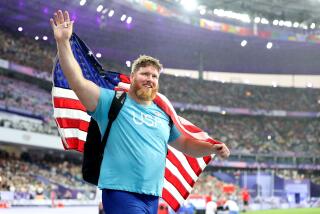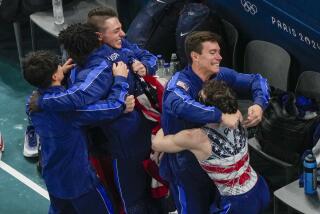‘94 WINTER OLYMPICS / LILLEHAMMER : The Force Is With Swiss Bobsledders : Two-man: Weder comes from behind to defeat countryman for gold. U.S. teams are 13th and 14th.
- Share via
HUNDERFOSSEN, Norway — Gustav Weder is not a Swiss watchmaker. The clock is in his head, the precision in his driving and preparation.
The 30-year-old physical education teacher proved it again Sunday, coming from behind in the fourth and final heat to defeat countryman Reto Goetschi by 0.05 seconds and repeat his 1992 victory in two-man bobsled.
That’s 20 Olympic, World Cup and European medals for the man who rules this empire under the nickname of Darth because it’s Weder, as in Vader.
“We’re competitive with him in the training runs, then he brings something out on race day,” said Jim Herberich, the driver of USA I. “If we could find out what it is, we’d be there with him, but it’s kind of frustrating to see such a large difference.”
Herberich and Chip Minton were 14th, 0.56 seconds behind Brian Shimer and Randy Jones, who were 13th, more than two seconds behind Weder, who has won almost all of those medals in sleds he has built himself, a technical yardstick for the U.S. drivers, developers and investors as they attempt to take their Bo-Dyn sleds to a higher level.
“Just because the sled has had a lot of publicity, that isn’t necessarily the thing that didn’t come through for us,” Harvard engineer Herberich said.
“There are so many other factors, like the starts, the driving, the level of competition. I think the sled itself is great. I wouldn’t change anything.
“I think it’s probably the fastest out here, and what it comes down to now is more research and development on the runners (the steel rails on which the sled rides).”
Shimer agreed.
“This was a four-year project we tried to condense to two,” he said of the one-plus year that the Bo-Dyns have been on the ice since NASCAR driver Geoff Bodine spearheaded development of the first U.S.-made sleds since 1956.
“The crew (from IBM and Chassis Dynamics in Connecticut) has done an unbelievable job getting them ready,” Shimer said. “I wish I had done better for them.”
He still could. He holds the track record here in four-man, next weekend’s concluding event of the Olympics. He also had the fifth-fastest time in the third heat Sunday, a measure of his and Jones’ championship form in the 1992-93 World Cup tour, after he had finished seventh with Herschel Walker in the ’92 Olympic two-man.
The inconsistency of his four runs in the two-man here characterized an admittedly difficult season in which he has:
--Battled injuries.
--Adjusted to a new sled and driving coach after the U.S. federation was unable to reach contract terms with his mentor, Meinhard Nehmer.
--Questioned the dedication of sledmates.
--Attempted to change pushers on the eve of Olympic two-man.
--Been accused of theft by a former teammate in a federal lawsuit that was recently withdrawn.
“Tough year,” Shimer said. “I fell off a little, and 10 or so other teams came on. I haven’t been as focused because of the distractions and my driving hasn’t been as good without Meinhard.
“I wish he was still around, but it’s up to me to make myself better. I’ve been disappointed with the work ethic, as I’ve said before, but I include myself in that.
“I also look at that time in the third heat and feel that with the Bo-Dyns, we have a lot of potential to tap into.
“People forget this was a whole new steering system and we had to do all of our testing in competition. I mean, you can simulate all you want, but you eventually have to do it on ice, and we don’t have the facilities in the U.S.”
Said Coach Joey Kilburn: “What we’ve done with the Bo-Dyns in a year or two is unheard of in the bobsled community. We’ve made tremendous inroads. I hate to get into percentages, but I’d say the sleds are 95%. Whether that other 5% rests with the runners or modifying the aerodynamics remains to be seen.”
They could ask Weder, but he probably wouldn’t help them. Even countryman Goetschi has to build his own. He had a lead of 0.03 seconds before the final heat, but clocked 52.93 compared to 52.85 for Weder, whose pusher, Donat Acklin, is the older brother of Guido Acklin, who pushes for Goetschi.
Italy’s Gunther Huber won the bronze, which follows the gold and silver his brothers, Willfried and Norbert, won in luge doubles. Another brother, Arnold, finished fourth in luge singles.
The Hubers have now won 43 Olympic, World Cup and European medals as the first family of sliding. And even Weder would have to concede that title to them.
More to Read
Go beyond the scoreboard
Get the latest on L.A.'s teams in the daily Sports Report newsletter.
You may occasionally receive promotional content from the Los Angeles Times.







